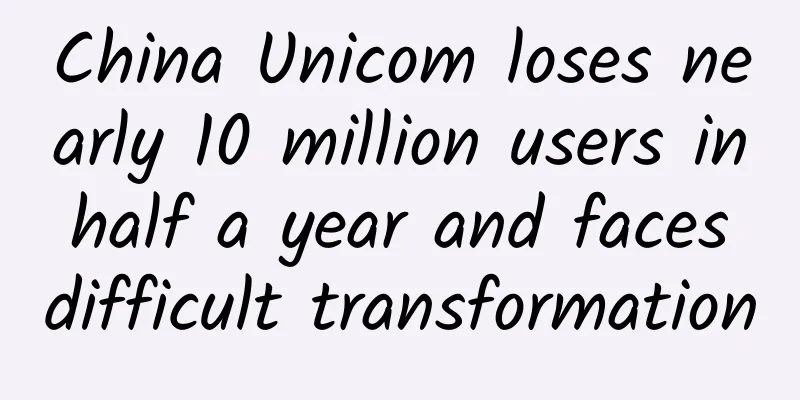|
China Unicom was shrouded in a "dark first half of the year". Except for a net increase of 80,000 mobile users in January, China Unicom lost more than one million mobile users every month from February to June 2015. The total number of mobile users decreased from 299 million to 289.3 million, with a total loss of 9.791 million mobile users, and a user loss rate of 3.27% in half a year.
This is the most serious user decline in history. However, many telecom industry insiders believe that "this is normal. If the telecom market is to return to rationality, it must abandon rigid user growth." One of China Unicom's senior executives told reporters: "There have been many bubbles in the growth in recent years. The new policies over the past year or so have broken these bubbles, but China Unicom has been the most affected."
At the media communication meeting on August 11, China Unicom also gave an official explanation: the continuous decline in the first half of the year was due to the saturation of the mobile market, which had almost no room for growth. Another reason was that the policies of "cost reduction" and "real-name system" had brought great impact to China Unicom's traditional development model, and the impact was much greater than that of China Telecom and China Mobile.
In contrast, in the first half of 2015, China Mobile added approximately 8.6 million new mobile users, while China Telecom added 5.82 million.
Growth Bubble
China's mobile users have clearly entered a saturation period. According to statistics from the Ministry of Industry and Information Technology in early 2015, the mobile phone penetration rate in more than 10 provinces in the country exceeded 100%, and the growth rate of mobile users has also slowed down significantly.
In 2013, the number of mobile users nationwide increased by 130 million, reaching a total of 1.234 billion, a growth rate of about 12%. However, in 2014, the number of mobile users nationwide only increased by 52 million, reaching a total of 1.286 billion. In the first half of 2015, the cumulative increase in mobile users of the three major operators was only 5 million, less than 20% of the same period last year.
"Even the growth in 2013 and 2014 was partly 'fabricated', not real users," a China Mobile employee told the reporter. "For operators, 'maintaining cards' is a necessary means, and part of the growth was fostered."
Frontline operators often open hundreds or even thousands of mobile phone numbers. "The monthly consumption of such numbers may be only a few cents," the source said. "The reason for maintaining the cards is to meet KPIs. Groups and provincial companies will assign growth targets to frontline personnel. In many cases, this target is out of touch with the market, and only by maintaining the cards can it be met."
However, in July 2013, the Ministry of Industry and Information Technology issued the "Regulations on the Registration of Real Identity Information of Telephone Users". In January 2015, the Ministry of Industry and Information Technology, the Ministry of Public Security and the State Administration for Industry and Commerce jointly issued the "Special Action Plan for the Governance of Telephone "Black Cards"", requiring telecommunications companies to achieve a real-name registration rate of more than 90% for all telephone users before December 31 this year.
Since the card numbers cannot pass the real-name system, the operators can only gradually eliminate these numbers. In addition, China Unicom Group has extremely strict requirements for KPI, so the proportion of card numbers maintained by China Unicom employees is much higher than that of the other two operators. "Therefore, China Unicom is the most affected." The mobile person analyzed, "However, the bursting of this bubble is positive, at least China Unicom can reduce a lot of burdens in its future development."
"The high terminal subsidies also brought some growth bubbles." A senior executive of Northern Unicom told reporters: "The group's requirement is that terminal subsidies are tied to the mobile phones and numbers purchased by users, but in reality, many 'games' are derived in various provinces."
For example, according to the group's regulations, Unicom users who buy a certain Samsung phone can enjoy hundreds of phone bill subsidies and hundreds of yuan in terminal price discounts. However, provincial and municipal companies often sell these phones through other channels. "The phones are sold to the channels, and the phone bills are sold online, or replaced with a batch of numbers with special time and data discounts and put on Taobao." A mobile phone channel person in Henan told reporters, "We call this practice 'packaged phones' in the industry. The channels and local companies share the subsidies originally given to users, and they can also supplement the growth KPI. The group does not care about these."
However, in the second half of 2014, after the State-owned Assets Supervision and Administration Commission issued a "marketing cost reduction" target to the three major operators, the three major operators drastically cut costs and even cancelled the terminal subsidy policy. In the first quarter of 2015, China Unicom's sales costs including terminal subsidies decreased by 36%, and China Telecom decreased by 7.7%.
The senior executive of Northern Unicom told the reporter: "So, this bubble burst, and Unicom cut the largest proportion of terminal subsidies, which had the most serious impact."
Poor transformation
The change in the policy environment broke China Unicom’s previous bubble-like development model, but the real problem is that China Unicom has not found a new development direction.
In the first quarter of 2015, China Unicom's mobile business revenue was 36.619 billion yuan, down 12.82% from 42 billion yuan in the first quarter of 2014. Even if the impact of the "business tax to value-added tax" policy is excluded, the decline in China Unicom's main business is still an indisputable fact. The main reason is that China Unicom's high-value 3G and 4G businesses have weak growth. Data shows that the ARPU value of 4G users is nearly twice that of average users.
In the first half of 2015, China Unicom's 3G and 4G users increased by only 8.68 million, and from January to May, the number of new users per month was only about 600,000, and the number of new users increased by 5 million in June alone. In contrast, in the first half of 2015, China Telecom's 3G and 4G users increased by 12.37 million, and China Mobile's 4G users increased by 80 million, far ahead of the other two.
"China Unicom's 4G development has almost stagnated." The aforementioned Unicom executive recalled: "Since the inspection team entered Unicom in January 2015, the entire Unicom has been busy with process reorganization. Many marketing strategies that may require leadership promotion and cost money have been shelved, and the market and social channels have been greatly affected." At the Unicom half-year meeting that just ended, "Unicom Group also asked provincial leaders to 'shoulder their responsibilities' and 'increase growth', but still no leader dared to start marketing again."
"But the marketing strategies of China Mobile and China Telecom have not been affected too much." The insider told the reporter, "Although both operators are required to reduce marketing expenses, the other two operators have made many adjustments, and the subsidies and channels for 4G users have not been affected too much." In the first quarter of 2015, China Mobile stated in its financial report that "the recovery of revenue growth was mainly due to the vigorous marketing activities of preferential tariffs."
Another mistake made by China Unicom was the misjudgment of 3G and 4G. In 2014, China Mobile invested heavily in building more than 500,000 4G base stations, and China Telecom also built tens of thousands of base stations, but China Unicom never made clear its attitude towards building 4G base stations. It is reported that China Unicom still regarded "3G as the investment focus and moderate investment in 4G" at that time. An obvious example is that, as of now, China Unicom is still selling a large number of iPhone 4S that do not support 4G and is still using the packages from a few years ago.
"In fact, the advantages accumulated by China Unicom in the 3G era have long been exhausted." The aforementioned China Unicom executive said: "Ordinary users are lost, and the high-value group customers and major customer businesses that have always been stable are also slowly shifting to China Mobile. China Unicom needs to adapt, but now there is no executable change strategy."
As a winner of Toutiao's Qingyun Plan and Baijiahao's Bai+ Plan, the 2019 Baidu Digital Author of the Year, the Baijiahao's Most Popular Author in the Technology Field, the 2019 Sogou Technology and Culture Author, and the 2021 Baijiahao Quarterly Influential Creator, he has won many awards, including the 2013 Sohu Best Industry Media Person, the 2015 China New Media Entrepreneurship Competition Beijing Third Place, the 2015 Guangmang Experience Award, the 2015 China New Media Entrepreneurship Competition Finals Third Place, and the 2018 Baidu Dynamic Annual Powerful Celebrity. |










